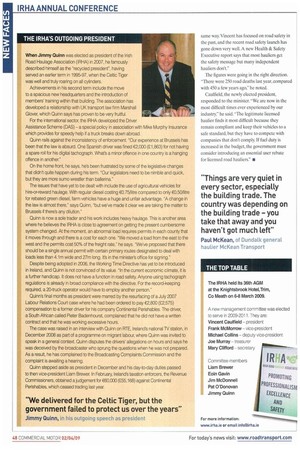THE IRHA'S OUTGOING PRESIDENT
Page 48

If you've noticed an error in this article please click here to report it so we can fix it.
When Jimmy Quinn was elected as president of the Irish Road Haulage Association (IRHA) in 2007, he famously described himself as the "recycled president", having served an earlier term in 1995-97, when the Celtic Tiger was well and truly roaring on all cylinders.
Achievements in his second term include the move to a spacious new headquarters and the introduction of members' training within that building. The association has developed a relationship with UK transport law firm Marshall Glover, which Quinn says has proven to be very fruitful.
For the international sector, the IRHA developed the Driver Assistance Scheme (DAS) a special policy in association with Mike Murphy Insurance which provides for speedy help if a truck breaks down abroad.
Quinn rails against the inconsistency of enforcement. "Our experience at Brussels has been that the law is absurd. One Spanish driver was fined €2,000 (21,863) for not having a spare roll for his digital tachograph. What's a minor offence in one country is a hanging offence in another."
On the home front, he says, he's been frustrated by some of the legislative changes that didn't quite happen during his term. "Our legislators need to be nimble and quick, but they are more sumo wrestler than ballerina."
The issues that have yet to be dealt with include the use of agricultural vehicles for hire-or-reward haulage. With regular diesel costing €0.75/litre compared to only €0.50/litre for rebated green diesel, farm vehicles have a huge and unfair advantage. "A change in the law is almost there," says Quinn, "but we've made it clear we are taking the matter to Brussels if there's any dilution."
Quinn is now a sole trader and his work includes heavy haulage. This is another area where he believes the BHA is close to agreement on getting the present cumbersome system changed. At the moment, an abnormal load requires permits in each county that it moves through and there is a cost for each one. "We moved a load from the east to the west and the permits cost 50% of the freight rate," he says. "We've proposed that there should be a single annual permit with certain primary routes designated to deal with loads less than 4.1m wide and 27m long. It's in the minister's office for signing."
Despite being adopted in 2006, the Working Time Directive has yet to be introduced in Ireland, and Quinn is not convinced of its value. "In the current economic climate, it is a further handicap. It does not have a function in road safety. Anyone using tachograph regulations is already in broad compliance with the directive. For the record-keeping required, a 20-truck operator would have to employ another person."
Quinn's final months as president were marred by the resurfacing of a July 2007 Labour Relations Court case where he had been ordered to pay €2,800 (22,575) compensation to a former driver for his company Continental Perishables. The driver, a South African called Pieter Badenhourst, complained that he did not have a written contract and that he was working excessive hours.
The case was raised in an interview with Quinn on RTE, Ireland's national TV station, in December 2008 as part of a programme on migrant labour, where Quinn was invited to
I' speak in a general context. Quinn disputes the drivers' allegations on hours and says he was deceived by the broadcaster who sprung the questions when he was not prepared. As a result, he has complained to the Broadcasting Complaints Commission and the complaint is awaiting a hearing.
Quinn stepped aside as president in December and his day-to-day duties passed to then vice-president Liam Brewer. In February, Ireland's taxation enforcers, the Revenue , Commissioners, obtained a judgement for €60,000 (255,168) against Continental Perishables, which ceased trading last year.














































































































































